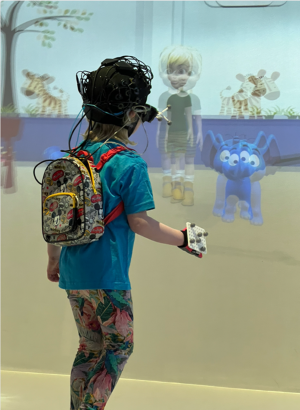 Our brand new ToddlerLab is open! If you live in or around London and are interested in participating in any of our studies, please REGISTER HERE.
Our brand new ToddlerLab is open! If you live in or around London and are interested in participating in any of our studies, please REGISTER HERE.
Click here for a detailed map of our location in central London. Click here for full instructions on finding us.
The world-first ToddlerLab is a dedicated 5-storey research facility developed for studying toddler and preschool development in naturalistic environments. The facility includes specialist laboratories such as the Home lab, the Preschool lab, the Brain lab, the Exploration lab, the Nap lab and the CAVE virtual reality lab, all equipped with wearable cutting-edge technologies that monitor brain and cognitive development across toddlerhood and beyond. Read about our grand opening!
Podcast: an introduction to the ToddlerLab with Professor Denis Mareschal
Watch our brand new video to peek inside our labs and learn more about what happens during a visit to the BabyLab & ToddlerLab! Read about a typical visit to the ToddlerLab as reported by The Guardian.
Research into typically developing children
Our research focuses on investigating the development in children during the first 5 years of life at different levels: behavioral, cognitive, neural, physiological and social. Developmental populations and toddlers in particular, may hardly comply with the requirements of conventional laboratory settings, where they are typically required to sit (sometimes still) in front of a computer screen. To this goal, we have equipped the ToddlerLab with wearable instrumentation and interactive labs to allow children to move freely and will less restraints. More importantly, the naturalistic labs give us the possibility to design more ecologically-valid and engaging experiments that are more similar to what children do in their everyday life (i.e. build a house with Duplo blocks). Therefore, tasks are a better model of real-world demands and we can thus study development more sensibly in more realistic scenarios.
When studying the children’s cognitive development, it is important to study the “body” as a whole and track changes at different levels: physiological, behavioral, neural, genetic. The body and the brain are, indeed, strongly interlinked to each other. Therefore, multimodal monitoring of infants and toddlers is the core of our research that aims to combine monitors of brain activity (fNIRS, EEG), physiological changes (heart rate, breathing rate, galvanic skin response), behavior (eye-tracking, video recordings, motion tracking), and genetics.
Research into autism and other developmental conditions
 Alongside the study of typical development, the ToddlerLab with its naturalistic laboratories gives us the opportunity to also identify atypical developmental trajectories. We can assess if a child’s developmental pattern diverges from the typical developmental curve, understand at which level this occurs and why certain milestones are not reached.
Alongside the study of typical development, the ToddlerLab with its naturalistic laboratories gives us the opportunity to also identify atypical developmental trajectories. We can assess if a child’s developmental pattern diverges from the typical developmental curve, understand at which level this occurs and why certain milestones are not reached.
A large body of our research focuses on understanding the basis of autism spectrum disorder (ASD). One in 100 people in the UK have autism. Together with their families, this means autism is a part of daily life for 2.8 million people. Identifying the early signs of developmental conditions like autism makes it possible to design earlier and more effective interventions that can help enhance the lives of these children and their families. These leading discoveries also help us inform policy that can influence how the healthcare and education sectors identify and support these children.
What next?
We are extremely grateful to have exceeded our crowdfunding target. If you missed the crowdfunding campaign and would like to donate in support of our ToddlerLab, please visit: www.bbk.ac.uk/donate/toddlerlab. Every little helps!!!
Your support will equip the ToddlerLab with sophisticated wireless technology allowing toddlers to be toddlers, while tracking their brain activity and monitoring their behaviour.
An exciting example of the cutting-edge technology in the ToddlerLab is a virtual environment known as the “CAVE”; which simulates real-world surroundings, such as a farm or a supermarket, and monitors how toddlers’ brain activity changes depending on the world around them.
Our staff are currently busy with the implementation of this project. Follow our updates here or on our social media.
Media
![]() Dr Natasha Kirkham discusses the new equipment, including the CAVE
Dr Natasha Kirkham discusses the new equipment, including the CAVE
The ToddlerLab has been made possible thanks to the generous support from:
- Wellcome Trust
- The Maurice Wohl Charitable Foundation
- The Wolfson Foundation
- CareTech Charitable Foundation
- Garfield Weston Foundation
- Elizabeth and Daniel Peltz OBE
- And the many donors who have supported this new research facility.
If you are interested in taking part in our studies, please sign up:
- Online form: follow this link
- Email: babylab@bbk.ac.uk. Please give us the same details as specified above, and we will get back to you as soon as possible.
- Phone: 020 3926 1207. If you leave a message, please tell us your name, phone number and your baby or child’s date of birth or age, and we will get back to you as soon as possible.
- By letter (no stamp needed): Birkbeck Babylab, FREEPOST RRGX-ARGH-SESR, Henry Wellcome Building, Birkbeck, University of London, Malet Street, London WC1E 7HX
